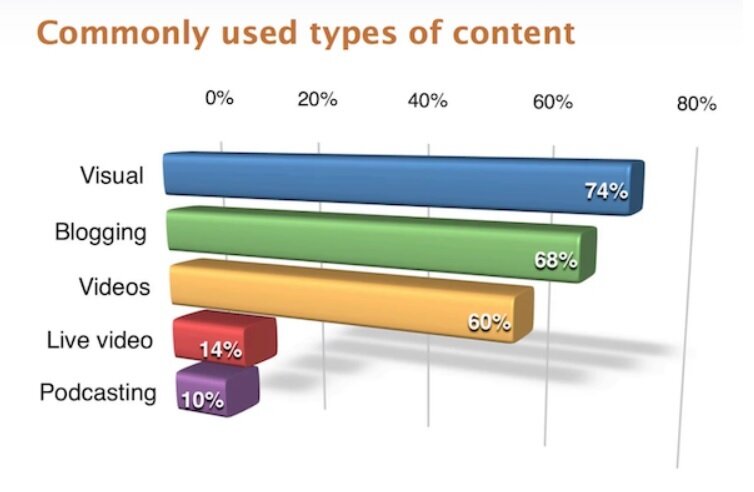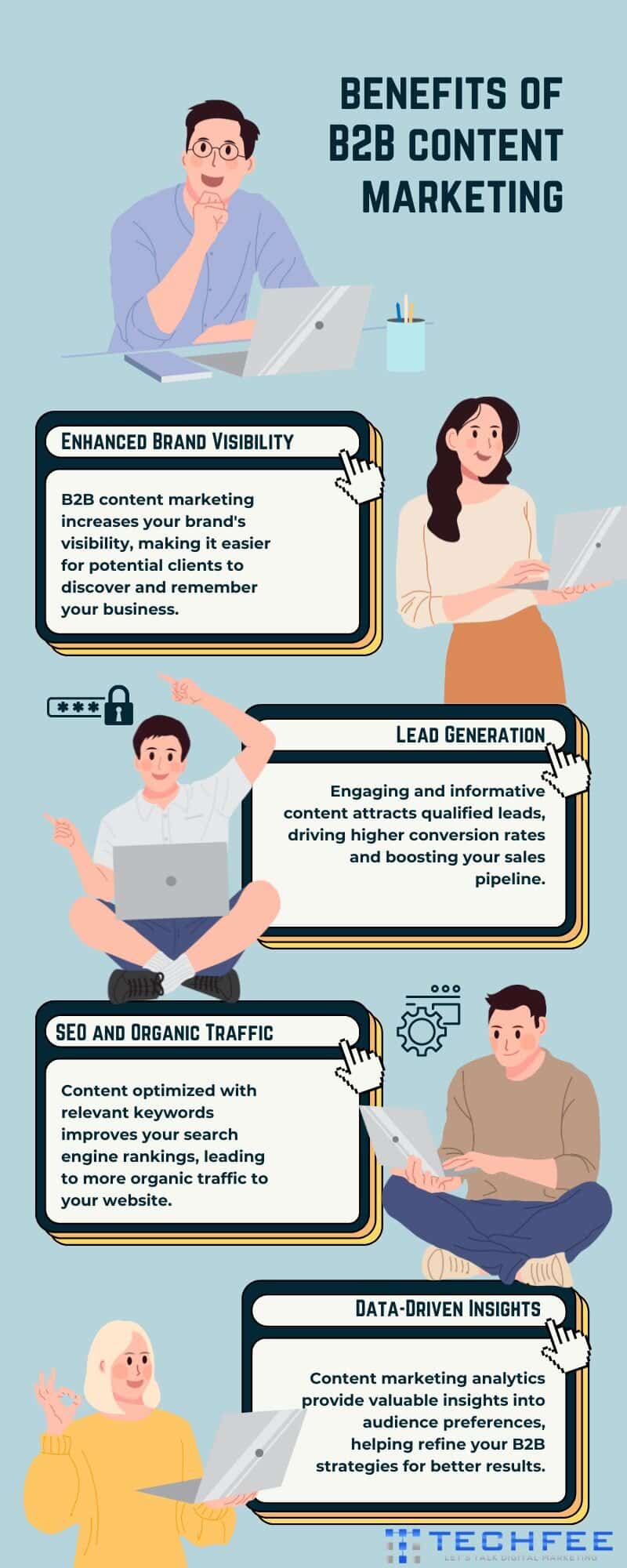B2B content marketing is a game-changer in enhancing your marketing strategy. But what exactly is B2B content marketing, and how can it benefit your business?
Let’s explore the B2B content marketing world and discover its immense potential.
By offering valuable insights, practical tips, and industry expertise, B2B content marketing positions your brand as a trusted thought leader while building trust among your audience.
Content marketing for B2B enterprises can deliver exceptional results for your business. Effective strategies can elevate brand awareness, generate high-quality leads, foster customer loyalty, and drive revenue growth.
In this article, I will dig into B2B content marketing, showcase remarkable strategies, share practical tips, and present success stories from esteemed subject matter experts.
So, without further delay, let’s embark on this exciting journey together, uncovering new opportunities and unlocking the true potential of B2B content marketing for your business.
Table of Contents
ToggleWhat is B2B Content Marketing?
B2B content marketing involves implementing a strategic approach around crafting and disseminating valuable and pertinent content, explicitly targeting businesses as potential customers. This marketing technique aims to captivate, engage, and convert businesses operating in a business-to-business (B2B) environment.
The main objective of B2B content marketing is to establish a sense of trust, credibility, and thought leadership within the industry by providing high-quality content tailored to address the specific needs and challenges businesses face.
This can be attained through various forms of content, such as well-crafted blog posts, informative whitepapers, insightful case studies, engaging videos, and visually appealing infographics.
By consistently producing targeted content, B2B companies have the opportunity to educate their target audience, enhance brand recognition, and promote long-term relationships with potential clients.
Effective B2B content marketing generates leads, drives conversions, and positions a company as a dependable industry authority, contributing to overall business growth and success.
Why is Content Marketing Important?
I can guarantee that content marketing in digital marketing plays a vital role in today’s digital landscape, offering numerous advantages for businesses of all sizes. It is a powerful tool for establishing a brand’s identity and showcasing expertise within a specific industry or niche.
By consistently creating valuable and high-quality content, companies can position themselves as thought leaders, building trust and loyalty among their target audience.
An added benefit is the ability to drive organic traffic to a website by optimizing content with relevant keywords, increasing visibility in search engine results.
Furthermore, content marketing facilitates engagement and customer retention by providing regular and engaging content that keeps customers interested and connected, fostering long-term relationships and encouraging repeat business.
Another significant aspect is its opportunity for businesses to perfectly communicate their unique value proposition and stand out from competitors.
By crafting compelling and personalized content, companies can effectively convey their brand message and leave a lasting impression in a crowded marketplace.
Lastly, content marketing is a cost-effective strategy compared to traditional marketing methods, as it can reach a wide audience at a fraction of the cost.
Difference Between B2C and B2B Content Marketing
The difference between B2C (Business-to-Consumer) and B2B (Business-to-Business) content marketing lies in their unique approaches to engaging their target audiences.
B2C content marketing aims to fascinate individual consumers by establishing emotional connections. It utilizes compelling narratives, visually appealing elements, and persuasive language to tap into consumers’ desires, needs, and aspirations. The focus highlights the promoted product or service’s benefits, convenience, and personal value.
On the other hand, B2B content marketing is geared towards a business-oriented audience comprising professionals, decision-makers, and companies. The content is designed to provide valuable insights, information, and solutions that address specific business challenges or goals.
B2B content marketing depends on industry expertise, data-driven analysis, and real-life case studies to showcase the featured products or services’ effectiveness and return on investment.
The primary goal is to build trust, establish credibility, and demonstrate the tangible business value that can be achieved through collaboration with the brand.
While both B2C and B2B content marketing share the common objective of attracting and retaining customers, their strategies diverge due to the inherent differences in their target audiences.
B2C content marketing employs emotional appeals and consumer-centric messaging, whereas B2B content marketing emphasizes rationality, expertise, and measurable business outcomes.
Understanding and acknowledging these differences enables marketers to tailor their content strategies effectively, engaging their intended audience and achieving their specific marketing objectives.
How to Do Content Marketing
Content marketing is a highly productive strategy that revolves around the creation and sharing of relevant, valuable, and consistent content aimed at capturing the attention and engagement of a specific target audience.
To successfully implement content marketing, deeply understanding your audience and their unique needs is crucial. Take the time to conduct thorough research and gain insights into their demographics, interests, and pain points.
The mandatory step is to develop well-defined content marketing strategies that align with your business objective and target audience. Clearly define your objectives, whether establishing brand awareness, generating leads, or establishing yourself as a thought leader in your industry. With your goals in mind, create a comprehensive plan to achieve them.
A successful content strategy should incorporate a variety of content formats, such as engaging blog posts, captivating videos, informative infographics, enlightening podcasts, and engaging social media posts. By diversifying your content, you cater to different preferences and reach your audience across multiple platforms.
Once you have a solid plan, consistently produce high-quality content that offers genuine value and solutions to your audience’s problems. Concentrate on delivering information, insights, and entertainment that aligns with your brand’s expertise and core values.
Additionally, optimize your content for search engines by skillfully incorporating relevant keywords and implementing SEO best practices. To maximize the visibility and reach of your content, strategically distribute it across various channels such as your website, blog, social media platforms, and email newsletters.
Lastly, evaluating and measuring the performance of your content marketing efforts is crucial for continual improvement. Utilize critical metrics such as website traffic, engagement levels, conversions, and customer feedback to gauge the effectiveness of your content.
These valuable insights will allow you to refine and enhance your content strategy over time, ensuring that you consistently deliver useful and compelling content that genuinely connects with your target audience.
Lastly, evaluating and measuring the performance of your content marketing efforts is crucial for continual improvement. Utilize critical metrics such as website traffic, engagement levels, conversions, and customer feedback to gauge the effectiveness of your content.
These valuable insights will allow you to refine and enhance your content strategy over time, ensuring that you consistently deliver useful and compelling content that genuinely connects with your target audience.
Types of B2B Content Marketing

Email Marketing
Email marketing is crucial in B2B content marketing strategies, enabling businesses to connect with their target audience effectively. It is a powerful tool for nurturing leads, increasing brand awareness, and driving conversions.
Crafting personalized email campaigns that resonate with recipients is critical to capturing their attention and motivating them to take desired actions, such as downloading informative resources, registering for webinars, or making purchases.
To optimize the impact of B2B email marketing, it is essential to create compelling subject lines, deliver valuable content that addresses specific pain points, and incorporate clear and enticing call-to-action buttons.
Blogging
Blogging is a precious tool within the domain of B2B content marketing. It is a platform for businesses to position themselves as thought leaders, gain trust and credibility, and actively engage with their target audience.
Companies can attract potential clients and generate high-quality leads by crafting well-researched and insightful blog posts. A successful B2B blog not only showcases the expertise of the business but also addresses common pain points and offers practical solutions that align with the target market’s needs.
Furthermore, blogging facilitates the formation of a sense of community, encouraging active participation through comments and social media sharing. It is a cost-effective strategy that enhances brand visibility, drives significant traffic to the website, and ultimately converts prospects into loyal, long-term customers.
Within B2B content marketing, blogging remains indispensable for companies seeking to establish a robust online presence and foster enduring customer relationships.
Whitepapers
Whitepapers serve as authoritative documents that delve deep into a particular topic or industry, offering comprehensive information and insightful analysis. Whitepapers are vital in educating and informing potential clients about complex issues, providing valuable solutions and knowledge.
By presenting well-researched and relevant information, whitepapers establish a company’s credibility and expertise, positioning them as industry leaders. These documents are effective lead-generation tools as they capture the interest of potential customers and offer informative content in exchange for their contact details.
Furthermore, whitepapers can be repurposed and shared across various platforms, boosting brand visibility and driving traffic to a company’s website. When implemented successfully, whitepapers are powerful resources that attract, engage, and convert B2B prospects, making them an integral part of any comprehensive content marketing strategy.
Social Media
Social media has become integral to modern content strategies for B2B. Its widespread popularity and ability to engage make it an invaluable tool for businesses to connect with their target audience more personally and interactively.
Using platforms like LinkedIn, Twitter, and Facebook, companies can share valuable industry insights and relevant news and establish themselves as authoritative figures in their respective fields.
Social media platforms also facilitate the development of solid relationships with clients and prospects, encouraging a sense of community and trust.
By creating strategic and engaging content, consistent posting, and active audience interaction, B2B organizations can enhance their brand visibility, attract leads, and ultimately drive conversions, contributing to their overall marketing success.
Webinars
These online webinars offer businesses a valuable platform to engage and educate their target audience conveniently and interactively. By leveraging webinars, companies can showcase their expertise, share valuable insights, and establish themselves as thought leaders.
Through engaging presentations, interactive Q&A sessions, and downloadable resources, webinars provide a unique opportunity for businesses to connect with prospects and generate high-quality leads.
Videos
In today’s digital landscape, where visual content reigns supreme, videos offer a compelling and interactive way for businesses to engage their target audience. They provide a dynamic platform to showcase products, services, and brand narratives, leaving a lasting impression on viewers.
From informative explainer videos to captivating product demonstrations and authentic customer testimonials, videos have the power to captivate and educate, influencing purchasing decisions and boosting brand awareness.
Moreover, videos can be easily shared across multiple channels, including sites, social media platforms, and email campaigns, maximizing their reach and impact.
By harnessing the potential of videos in B2B content marketing, businesses can forge stronger connections with their audience, enhance their brand reputation, and propel business growth.
Case Studies
Case studies play a vital role in B2B content marketing. They are valuable tools to demonstrate a product or service’s practical application and benefits in real-world scenarios.
By presenting compelling and unique success stories, case studies provide concrete evidence of a business’s problem-solving capabilities and the positive outcomes achieved for clients. These narratives follow a structured format, outlining the challenges faced, the innovative solutions provided, and the measurable results obtained. Sharing such success stories helps establish credibility and trust and showcases the expertise and differentiation of a business from its competitors.

How to Create B2B Content Marketing Strategies
1. Conduct Audience Research
Crafting compelling B2B content marketing strategies involves delving into comprehensive audience research. It’s essential to truly grasp your target audience to create content that deeply resonates and fascinates them.
Start by separating the critical characteristics of your B2B audience, including industry, job roles, company size, pain points, and objectives.
Employ diverse research methods like surveys, interviews, and market analysis to acquire invaluable insights. Scrutinize data and demographics to segment your audience into distinct buyer personas.
By fully understanding their needs, challenges, and motivations, you can tailor your content to address their pain points and offer valuable solutions.
Embracing this research-driven approach empowers you to fashion a content strategy that captures your audience’s attention, sets up your brand as a trusted industry authority, and propels conversions and business expansion.
2. Use Micro-Targeting to Narrow Down Your Focus
When creating B2B content marketing strategies, one crucial step is to utilize micro-targeting to narrow your focus. Micro-targeting allows you to identify and understand specific segments within your target audience, enabling you to tailor your content to their unique needs and preferences.
By leveraging data and analytics, you can gather insights about your audience’s demographics, interests, pain points, and buying behaviors.
This valuable information empowers you to develop highly personalized and relevant content that resonates with each micro-segment. Whether through customized email campaigns, targeted social media ads, or industry-specific content, micro-targeting enables you to reach the right audience with the right message at the right time.
Focusing your efforts on specific segments can increase engagement, improve conversion rates, and drive meaningful results for your B2B content marketing goals.
3. Do Competitors Research in your Niche
Developing an effective B2B marketing content strategy involves a critical step: conducting thorough research on your competitors within your specific industry.
By delving into your niche, you can gain valuable insights into the strategies employed by your rivals, identify gaps in the market, and unearth opportunities for differentiation.
Examining your competitors’ content allows you to grasp their strengths, weaknesses, and the approaches they utilize to engage their target audience.
By scrutinizing the type of content they produce, the platforms they leverage, and the messaging they convey, you can create a comprehensive content strategy that sets you apart from the competition, fills content voids, and resonates with your intended customers.
The ultimate objective is to utilize the knowledge acquired through competitor research to craft unique, valuable content that captivates your audience and establishes your brand as an industry thought leader.
4. Define Your Goals
This process involves clearly outlining your objectives and aspirations to ensure a focused and successful approach. Begin by identifying what you aim to accomplish through your content marketing efforts.
Are you seeking to enhance brand awareness, generate valuable leads, or boost conversions? Once you understand your goals comprehensively, you can tailor your content strategy accordingly, making it unique to your business.
Defining your goals establishes a solid foundation for developing a targeted content marketing strategy that aligns with your business objectives.
5. Perform a Content Audit
A content audit involves thoroughly assessing and analyzing a company’s existing content assets to gain valuable insights and identify areas for improvement. It begins by taking inventory of all content pieces, such as blog posts, white papers, case studies, videos, and social media posts.
These assets are then categorized based on relevance, quality, and performance in achieving desired outcomes. The next step involves evaluating key metrics like website traffic, engagement levels, conversion rates, and generated leads for each content piece. This analysis identifies high-performing content that successfully engages the target audience and contributes to business objectives.
Simultaneously, it reveals gaps and opportunities where new content or repurposing existing assets can fill in. By conducting a comprehensive content audit, businesses can refine their content marketing strategies, ensuring alignment with their goals and creating B2B content that resonates with their target audience while driving desired results.
6. Create Content for All Phases of the Marketing Funnel
When devising B2B content marketing strategies, it’s crucial to consider the different stages of the marketing funnel. This funnel typically comprises three key phases: awareness, consideration, and decision.
Crafting engaging content that caters to the needs and pain points of potential B2B customers at each stage is of utmost importance.
During the awareness stage, the primary objective is to capture the target audience’s attention and introduce them to your brand or solution.
Creating content that educates and provides valuable insights is essential to achieve this. This can be done through various mediums, such as blog posts, infographics, and social media content, where you can demonstrate your industry expertise, highlight emerging trends, and address common challenges.
Moving on to the consideration stage, the focus shifts towards nurturing prospects who have shown interest in your brand. At this point, building trust, establishing credibility and positioning your offering as a viable solution is crucial. White papers, case studies, and webinars effectively provide in-depth information, showcase successful implementations, and leverage customer testimonials.
Finally, in the decision stage, the content should drive conversions and motivate the audience to take action. Prospects in this stage actively evaluate different options, so it’s essential to provide compelling reasons for them to choose your solution. Offering product demos, free trials, and comparison guides can help them make informed decisions and emphasize the unique value your offering brings.
By aligning your B2B content marketing strategies with the different stages of the marketing funnel, you can effectively guide potential customers through their buying journey, establish a robust brand presence, and drive meaningful conversions.
7. Leverage SEO for B2B Content
Search Engine Optimization (SEO) is vital in driving organic traffic to your B2B website and attracting potential clients. To harness the full potential of SEO for B2B content, it is essential to conduct thorough keyword research and identify relevant terms that resonate with your target audience.
You can improve your website’s visibility in search engine results by strategically incorporating these keywords into your content, such as videos, blog posts, articles, and whitepapers. Optimizing various on-page elements, including title tags, meta descriptions, and header tags, significantly improves search rankings.
Moreover, building a solid backlink profile by acquiring high-quality links from authoritative B2B websites further amplifies your SEO efforts. By effectively leveraging SEO, businesses can elevate their B2B content marketing strategies, enhance their online presence, and drive valuable organic traffic.
8. Amplify Reach with Social Media
Social media platforms have revolutionized how businesses connect with their target audience, allowing for broader reach and engagement. Creating a well-crafted social media strategy tailored to your goals is crucial to enhance reach.
Identify the social media platforms that align best with your target audience. Understand the unique characteristics of each platform and adapt your content to resonate with its users.
Capitalize on social media advertising to expand your reach and engage with specific demographics. Collaborating with influencers and industry thought leaders can significantly increase your brand’s visibility and credibility.
Lastly, measure the success of your social media efforts by analyzing relevant metrics and making data-driven adjustments to optimize your strategy.
By following these steps, you can effectively harness the power of social media to amplify your reach and elevate your B2B content marketing strategy.
9. Influencer Marketing in B2B Content
One of the most powerful steps gaining popularity these days is Influencer Marketing in B2B Content. This strategy involves partnering with industry experts, thought leaders, or even satisfied customers with a strong following to promote your brand. Collaborating with these influencers can establish a more significant brand presence and build trust among your target audience.
The first step to implementing a successful B2B content strategy using Influencer Marketing is identifying relevant influencers in your niche. Once you’ve found the right fit, engaging with them to co-create content can amplify your brand’s message and extend its reach.
From guest blog posts to social media takeovers and video collaborations, numerous ways exist to collaborate and showcase your brand’s value.
You can establish authentic connections with your audience by integrating influencer-generated content into your overall strategy. The content feels more genuine and relatable from a trusted source, leading to higher engagement and conversion rates.
As influencers share the content with their followers, your brand gains exposure to a wider audience, attracting potential customers and expanding your market reach.
10. Update existing content
To get started, conducting a thorough content audit is a must. This allows businesses to identify which materials may require improvement or need updating.
Valuable insights can be gained by analyzing critical metrics like engagement, conversion rates, and customer feedback.
Once the content gaps are recognized, it’s time to plan the necessary updates and improvements. This may involve refreshing statistics, integrating the latest industry trends, or revamping the content’s presentation to align with current market demands.
Repurposing existing content into various formats, such as infographics, videos, or podcasts, can significantly expand its reach and appeal to a broader audience.
Regularly updating content ensures relevance and is crucial in maintaining SEO rankings and attracting potential clients. Following these steps diligently empowers businesses to create compelling B2B content strategies that yield meaningful results and foster long-term success.
With an ever-evolving market, staying ahead through continuous content updates is the key to staying relevant and engaging with the target audience effectively.
11. Promote Your Content Effectively
One of the pivotal steps in this process involves mastering the art of “Promoting Your Content Effectively.” Once you’ve meticulously crafted content that adds value and captivates your audience, the next crucial phase is ensuring it reaches the right people and leaves a lasting impact.
Doing this starts with deeply understanding your target market and their pain points. Tailor your content to address these specific challenges directly while providing practical solutions that resonate with your audience.
Embracing a diverse range of distribution channels, including social media, email marketing, and niche-specific platforms, allows you to amplify the reach of your content significantly. Collaborating with influencers or key industry figures can also prove instrumental in leveraging their networks and garnering greater exposure.
To refine your B2B content strategies over time, regularly monitor and analyze your content’s performance, making data-driven adjustments that continually improve your content’s effectiveness.
12. Collaborating with Sales and Marketing Teams
Developing a successful B2B content strategy requires a close and fruitful partnership with the sales and marketing teams. This collaboration is vital in ensuring that the content created perfectly aligns with the company’s overall goals and objectives.
Engaging with the sales team allows content creators to gain invaluable insights into customers’ pain points, preferences, and commonly asked questions. This in-depth understanding empowers them to craft content that directly addresses these specific needs, making it more relevant and captivating for the intended audience.
Concurrently, joining the marketing team offers a better grasp of the brand’s voice, positioning, and ongoing promotional efforts. This synergy paves the way for the content strategy to complement and bolster existing marketing campaigns, leading to a seamless and impactful customer experience throughout the buyer’s journey.
Emphasizing this robust collaborative approach allows B2B organizations to forge content strategies that drive engagement, generate leads, and foster long-term business growth.
13. Measuring and Analyzing Content Performance
Creating effective B2B content strategies involves a crucial step of measuring and analyzing content performance. Understanding what works and what doesn’t in the dynamic world of digital marketing is essential.
By carefully evaluating how our content performs, we can identify the most engaging and successful pieces, enabling us to replicate their success in future campaigns. Key metrics such as website traffic, click-through rates, conversion rates, and social media engagement provide valuable insights into content effectiveness.
Additionally, tracking visitors’ time on our website and the bounce rates can reveal whether our content truly resonates with our target audience. Armed with this valuable data, we can optimize our B2B content strategies, refine our messaging, and tailor our content to suit our audience’s preferences better.
This data-driven approach empowers us to stay ahead of the competition and consistently deliver valuable, relevant, and compelling content to our prospects and customers.
B2B Content Marketing Tools
Google Analytics
Google Analytics is invaluable in understanding how users interact with your website. It empowers you to track the sources of your visitors, their actions and behaviors while on your site, and the time they spend before moving on. These valuable data points offer many opportunities to optimize your content marketing strategy and enhance the user experience.
Buzzsumo
Buzzsumo is an incredible tool that keeps you updated on the hottest topics buzzing around the internet. With its involuntary search bar, you can effortlessly explore any subject and tap into ongoing conversations across the online community.
Additionally, the platform allows you to curate customized lists of keywords specific to different industries, empowering you with valuable insights for your research and content strategy.
Buffer
Buffer presents a fantastic service that empowers you to schedule and manage your social media posts across multiple platforms effortlessly. Once your content is ready, you can choose the perfect time to share it with your audience.
If you ever need creative inspiration, Buffer offers a handpicked collection of ideas to help spark your imagination and engage your followers in exciting new ways.
Hootsuite
HootSuite presents a social media management platform that streamlines the process of scheduling tweets like never before. Integrate all the accounts you wish to manage into one central location to get started.
From there, effortlessly select the desired timing for their tweets. Whether you prefer pre-written messages or crafting your own, HootSuite offers a user-friendly drag-and-drop editor for seamless customization.
Case Studies and Success Stories
Hubspot Case Study
One outstanding example of successful B2B content marketing comes from HubSpot, a leading inbound marketing and sales software company.
HubSpot’s content marketing strategy provides valuable resources to its target audience, primarily marketers and business owners. They utilize blog posts, ebooks, webinars, and podcasts to share insights, tips, and best practices on digital marketing, sales, and customer service topics. HubSpot has positioned itself as an authoritative thought leader by consistently offering high-quality, educational content.
I have also been following and implementing their strategies for a long time for my blog in my content.
As a result, they have built a massive community of loyal followers, generated substantial organic traffic, and attracted numerous high-quality leads. HubSpot has converted these leads into paying customers through this content-driven approach, experiencing remarkable business growth.
Adobe Case Study
Another exemplary case is Adobe, a multinational software company. Adobe has achieved remarkable success with its B2B content marketing efforts by focusing on creativity and innovation.
They provide valuable content through their blog, Adobe Creative Cloud, which offers tutorials, industry insights, and showcases the work of creative professionals. This approach helps Adobe establish credibility and expertise in its field and fosters community among its target audience.
By understanding the needs and aspirations of its customers and addressing them through inspiring content, Adobe has strengthened its brand presence, increased customer loyalty, and drive considerable business growth.
From these case studies, several lessons and best practices can be extracted for successful B2B content marketing:
- Understand your audience: Both HubSpot and Adobe succeeded by understanding their target audience’s pain points, interests, and aspirations. This enabled them to create content that resonates with their potential customers and provides genuine value.
- Consistency is key: Both companies maintained a consistent content publishing schedule, ensuring their audience always had fresh and relevant content to engage with. Consistency builds trust and keeps the audience coming back for more.
- Quality over quantity: Instead of producing a vast amount of content, focus on delivering high-quality, well-researched, and insightful pieces. Valuable content attracts a loyal audience and encourages sharing, increasing brand visibility.
- Thought leadership: Positioning yourself as a thought leader in your industry can significantly impact your brand’s reputation and credibility. Share industry insights, data-driven research, and expert opinions to establish authority and trust.
- Embrace multiple content formats: Both companies leveraged various content formats, such as blog posts, ebooks, webinars, and podcasts, catering to the different preferences and learning styles of their audience.
- Foster a community: Engage with your audience actively by responding to comments, encouraging discussions, and showcasing user-generated content. Building a sense of community strengthens the brand’s and its customers’ bond.
- Measure and adapt: Analyze the performance of your content regularly, track key metrics, and use the insights to refine your content marketing strategy continually. Adapt to changing trends and preferences to stay relevant.
Successful B2B content marketing requires a deep understanding of your audience, consistent delivery of valuable content, thought leadership, and a willingness to adapt.
By learning from the successes of companies like HubSpot and Adobe, businesses can implement these best practices and achieve significant business growth through content marketing efforts.
Conclusion
B2B content marketing is vital to unlocking remarkable success for businesses in today’s competitive landscape. Understanding the nuances of B2B content marketing and its distinctions from B2C strategies empowers companies to tailor their approach and effectively engage their target audience.
Recognizing the key role of content marketing in the modern business world, organizations can harness various content types to connect deeply with prospects and build lasting relationships.
Businesses can set themselves apart and thrive by crafting well-researched B2B content marketing strategies that align with customer needs.
Embracing the potential of B2B content marketing becomes even more critical as we navigate the ever-evolving digital era, where it can elevate brands, foster brand awareness, and ensure sustained growth in the competitive B2B landscape.
Frequently Asked Questions
Is content marketing worth it?
Yes, content marketing is worth it. It is an effective strategy for building brand awareness, engaging with your target audience, and establishing your expertise in the industry. Creating valuable and relevant content can attract and retain customers, increase website traffic, and drive business growth.
What does content marketing include?
Content marketing includes creating and distributing valuable and relevant content, such as articles, blog posts, videos, infographics, social media posts, and more, aiming to attract and engage a target audience, build brand awareness, and drive profitable customer actions.
What does a B2B content marketing specialist do?
A B2B content marketing specialist is responsible for developing and executing content strategies tailored to the needs of businesses (B2B stands for "business to business"). They create and promote valuable and relevant content, such as articles, whitepapers, case studies, and webinars, to attract and engage the target audience, drive lead generation, and ultimately support the company's business goals in the B2B space.
What Makes a Good B2B Content Marketing Campaign?
A good B2B content marketing campaign is characterized by creating high-quality, informative, and relevant content that addresses the specific needs and challenges of the target audience. It should be strategically distributed through various channels, effectively promoting the brand's expertise and value proposition. Additionally, a good B2B content marketing campaign is data-driven, measuring and analyzing the performance of the content to improve and optimize results continually.
How do I identify my target audience for B2B content marketing?
To identify your target audience for B2B content marketing, conduct thorough market research and analyze your existing customer base. Understand the industry, business size, location, pain points, and challenges your product/service addresses. Create buyer personas to represent your ideal customers, considering their roles, responsibilities, goals, and preferences. Use data analytics and engagement metrics to refine your understanding and ensure your content resonates with the right B2B audience.
What are the key steps in planning a B2B content marketing strategy?
The critical steps in planning a B2B content marketing strategy are:
- Define Goals: Clearly outline your objectives and what you want to achieve with your content marketing efforts in the B2B space.
- Know Your Audience: Conduct thorough research to understand your target B2B audience's needs, challenges, and preferences.
- Develop Buyer Personas: Create detailed profiles of your ideal B2B customers, considering their roles, pain points, and decision-making processes.
- Content Ideation: Brainstorm content ideas that align with your audience's interests and address their pain points.
- Content Formats: Decide on the types of content you'll produce, such as blog posts, whitepapers, webinars, videos, etc.
- Content Calendar: Create a schedule for producing and publishing content, ensuring consistency and relevance.
- Promotion Strategy: Plan how to distribute and promote your content across various channels like social media, email marketing, and industry publications.
- SEO and Keywords: Optimize your content for search engines using relevant keywords to improve its discoverability.
- Measure and Analyze: Implement tools to track the performance of your content, analyzing metrics like engagement, conversions, and ROI.
- Iterate and Improve: Based on data insights, continuously refine your B2B content marketing strategy for better results.
How can I create engaging content for B2B audiences?
To create engaging content for B2B audiences, focus on these key strategies:
- Understand Your Audience: Conduct thorough research to understand the needs, pain points, and interests of your B2B audience.
- Address Their Challenges: Create content that provides practical solutions to the specific challenges faced by your B2B customers.
- Be Informative and Relevant: Offer valuable and insightful information that educates and helps your audience make informed decisions.
- Use Visuals and Multimedia: Incorporate visuals, infographics, and videos to enhance the appeal and accessibility of your content.
- Showcase Your Expertise: Demonstrate your industry knowledge and expertise to build trust and credibility with your B2B audience.
- Craft Compelling Headlines: Write attention-grabbing headlines that entice your audience to click and explore your content further.
- Tell Stories: Use storytelling techniques to make your content more relatable and engaging for your B2B audience.
- Optimize for Readability: Use clear and concise language, summarize text with subheadings, and use bullet points to improve readability.
- Include Call-to-Actions (CTAs): Encourage your B2B audience to take the next step by including clear and relevant CTAs in your content.
- Encourage Interaction: Foster engagement by inviting comments, feedback, and questions from your B2B audience.
What role does SEO play in B2B content marketing?
SEO (Search Engine Optimization) plays a crucial role in B2B content marketing by helping businesses increase online visibility and reach their target audience. By optimizing B2B content with relevant keywords, meta tags, and other SEO best practices, companies can improve their search engine rankings, driving organic traffic to their website. This increased visibility enhances brand awareness, generates more leads, and ultimately contributes to the success of the overall content marketing strategy in the B2B space.
How can social media platforms be leveraged for B2B content marketing?
Social media platforms can be leveraged for B2B content marketing in several ways:
- Content Distribution: Share your B2B content, such as blog posts, whitepapers, and videos, on social media to reach a wider audience and increase visibility.
- Engagement and Interaction: Engage with your B2B audience by responding to comments, messages, and mentions, fostering meaningful interactions.
- Industry Thought Leadership: Establish your brand as a thought leader by sharing valuable insights, expertise, and industry trends.
- Visual Content Sharing: Utilize visual content, like infographics and slideshows, to make complex B2B information more digestible and shareable.
- Paid Advertising: Utilize social media advertising to target specific B2B audiences and promote your content to relevant prospects.
- LinkedIn for Networking: Utilize LinkedIn to build professional connections, participate in industry groups, and share content with a more focused B2B audience.
- Hashtags and Trends: Use relevant hashtags and monitor trending topics to join conversations and increase the discoverability of your B2B content.
- User-Generated Content: Encourage your B2B audience to create and share content related to your brand, fostering authenticity and social proof.
- Live Video and Webinars: Host live video sessions or webinars on social media to engage directly with your B2B audience in real time.
Data Analytics: Utilize social media analytics to track the performance of your B2B content and refine your strategy based on insights.
What metrics should I track to measure the success of my B2B content marketing campaigns?
To measure the success of your B2B content marketing campaigns, track the following key metrics:
- Website Traffic: Monitor the number of visitors visiting your website through various content channels to assess overall campaign reach.
- Engagement Metrics: Monitor metrics like time spent on a page, bounce rate, and scroll depth to gauge how well your content resonates with the audience.
- Conversion Rate: Measure the percentage of website visitors who take the desired action, such as filling out a form or subscribing to your newsletter.
- Lead Generation: Track the leads generated through content downloads, contact forms, or other conversion points.
- Social Media Metrics: Monitor likes, shares, comments, and click-through rates on social media posts to evaluate content engagement.
- Email Marketing Metrics: Measure open rates, click-through rates, and conversion rates for emails containing your content.
- SEO Performance: Check your rankings for target keywords and monitor organic search traffic to understand the impact of your content on search visibility.
- Backlinks and Referral Traffic: Assess the number of quality backlinks your content earns and the traffic it generates from external sources.
- Content Consumption: Analyze how different content pieces perform regarding views, downloads, and interactions.
- Return on Investment (ROI): Calculate the cost of creating and promoting content versus the revenue or business value generated from content-driven conversions.



 Twitter
Twitter Facebook
Facebook Linkedin
Linkedin







